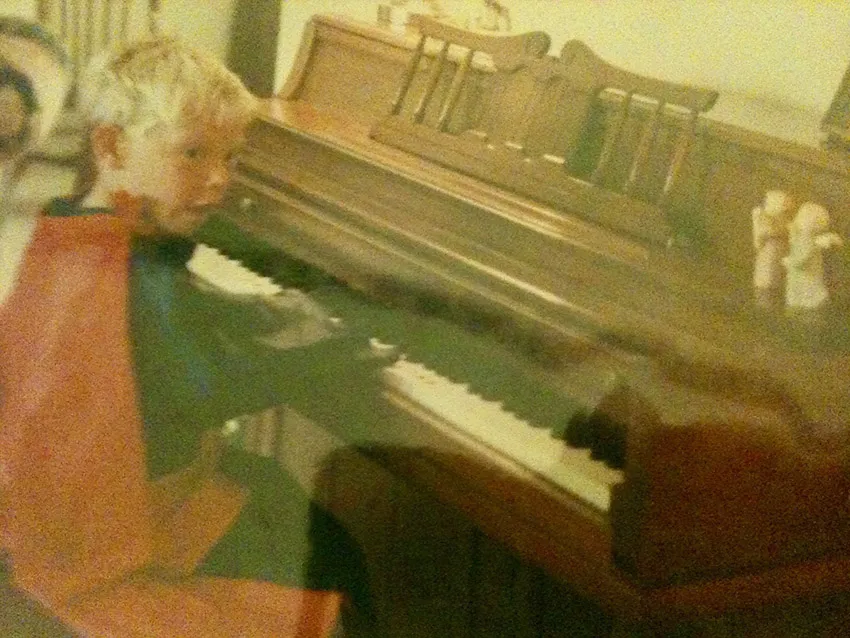When writer Greg Marshall set out to write a memoir, he had no idea what he was getting into. Inspired by childhood stories and his wacky family, he thought his book would be a classic tale of a Queer kid coming of age in the '90s – until he discovered a secret that would change his life forever.
"When I was nearly 30 years old and going through my childhood medical records, I discovered that I had cerebral palsy. It was the kind of revelation that made these funny family stories take on a new depth and weight," he said of his new book, Leg: The Story of a Limb and the Boy who Grew from It.
Bringing his leg to the page
The book took on a new shape following Marshall's discovery. Like many people who unearth later-in-life diagnoses, he spent a lot of time reexamining parts of his childhood and trying to understand what role his disability had played in his life, even before he knew he had one.
"Once I brought my leg to the page, the rest of me followed," he said. "I started to allow my body and person to show up on the page in ways I hadn't before. Then the book became this confrontation with queerness and disability in my family, and looking at those things as sources of not just tension but intimacy, and how disability and queerness course through the life of a family."
Marshall started to find threads of connection between himself and his parents, who also developed debilitating illnesses as he grew up. "My dad passed away from ALS, and I was one of his caregivers," he said. "My mom has had cancer for years – non-Hodgkin's lymphoma and breast cancer – and has beaten all kinds of medical odds. I saw that it wasn't just me having a disability. We're all on this disability spectrum in life."
Looking back at his childhood with a new lens, Marshall saw that much of the ableism he faced and internalized came from a sense of shame society tends to place on people with different abilities. Hiding his diagnosis was a way of feeding into that shame.
However, caring for his father during the late stages of ALS helped Marshall learn how to move past ability prejudice. "Shame, secrecy, and taboo kind of starts to go out the window, because you see how much you need each other and how precious life is," he said. "The body and the mind are so separate."
"When you burst through those taboos of shame or need, medical need, you become so much closer," he continued. "For me and my dad, with his ALS and my CP, we had moments of bodily communion where we related to what the other was going through. We didn't have the same prognosis or experience, but for example, I was able to stretch him. I had been through a lifetime of physical therapy, so I knew how to stretch his limbs better than my siblings."
Reexamining his memories
Discovering his diagnosis changed the way Marshall viewed his childhood memories. An early draft of one of his essays was about his childhood obsession with The Wizard of Oz and his subsequent acting career. At first, Marshall examined the experience of meeting an actor who played a Munchkin in the original film production through the lens of being a closeted Queer kid.
"It wasn't until I found out that I had CP that that deeper layer or that puzzle piece clicked into place," he explained. "It was the funniest thing. Before I knew about CP, I still had the same experiences, but [then] it was like somebody had taken the blinders off. I could suddenly see – not just my disability and how I walked around the stage with a noticeable limp. Certainly, that was something audience members were clocking, and my fellow cast members were well aware of, but I'd always thought of myself as a star."
Marshall realized that his disability affected what parts he did and didn't get. He took offense when teachers offered him disability-coded parts, like Quasimodo, but overlooked him for general leads like Dennis the Menace. He also recalled a feeling of disdain for the Munchkin he met, unaware of how her bodily differences shaped the roles she was offered.
Marshall also realized that the way his parents saw him was also affected. Though they did not share his diagnosis with him, they were both aware he had CP. In middle school, Marshall took a class trip to France and was upset that his "dorky dad" came along as a chaperone.
"Looking back with the knowledge of my disability, I was suddenly aware that my parents were doing that for me," he said. "They wanted me to have the security of a parent chaperone with me. So much of my life [it] seemed that people had been more generous toward me. I was able to see myself more clearly, and I was able to give myself a little bit more grace in the process."

Family history fosters intimacy
Digging deeper into his family stories allowed Marshall to connect with people in his life in a new way. He spent hours interviewing his family members about the stories he wanted to retell in Leg, which wasn't always easy.
"So much of the time, they were uncomfortable. Especially with my mom," he said. "She was hard to talk to initially, but we had many beautiful moments. We always talk about seeing our parents for the first time as adults, but I think the interview process with my mom allowed her to see me as an adult."
Reexamining the stories he had grown up with also helped Marshall gain a new perspective as a professional writer. While writing his book, he asked his mom to retell his birth story.
"She went bowling and had amniotic fluid start leaking at the bowling alley, so she drove to the hospital," he said. "She tells this story of her doing a headstand in the hospital bed to get me off the umbilical cord, and that there was a watermark on the wall right across from where she was sitting that was 'in the exact shape of William Shakespeare,' and that's how she knew I was going to be a writer.
"So you take the lore of a birth story and ask real questions about that, like, 'Well, was that really scary?' She'd always told it to me as a funny story and how 'it was almost this wild thing that happened,' but then [you] go back with an adult's knowledge and say, 'You were alone in this delivery room' – it was a couple of months before my due date, so it wasn't anything that she was expecting – and ... have a meeting of minds as adults on these topics."
Keeping it light
One thing apparent about Marshall's whole family is their sense of humor. Whether it was his mom telling stories of his prophetic birth or the family referring to his father as "neck-less" after a severe spinal cord injury left him without mobility in his neck, the people who raised him knew how to make light of a difficult situation.
"For so much of my life, humor and tragedy were just sitting side by side in the room," Marshall said. "Sometimes the humor in the book can come from this French farce nature, where the reader knows information that I didn't know as a kid, so there's almost this sitcom-level of misunderstanding."
He likens his role in the memoir to that of Stewie in Family Guy. "He's a baby, but he has an adult consciousness. That's a little bit of the humor of Leg. You're going through these awkward, cringy experiences, but you have an adult perspective layered over these things," he said.
"My story would be classified as a tragedy if it didn't have this grace of hindsight and perspective and letting the dust settle."
Humor has helped Marshall and his family push past the shame and stigma placed on the identities they carry. "One way life can be funny is by being super honest. Once you can push past the cringe, life can just read as really funny," he said. "I think there's a way of activating [taboo and shame] to a humorous end. We laugh when we're uncomfortable; we laugh when we're surprised."
While the Marshall family knows a thing or two about laughter, he credits his mom for teaching him the most about finding humor in the dark times. "She was the chemo patient who would show up in a grass skirt and a coconut bra and hula into the chemo room as kind of a schtick. She'd show up with those glasses that have eyeballs dangling on springs. She consciously turned it into a humor routine," he said.
In many ways, his mother has inspired him. When he was a kid, she wrote a weekly column for their local paper. Growing up, he watched as she cared for his father as his condition declined. Even when life dealt her multiple cancer diagnoses, she took it in good stride.
As it turned out, his mother also learned a thing or two from Marshall. "My mom, after my dad passed away, ended up in a relationship with one of her former cancer doctors, a reconstructive plastic surgeon. This woman saved my mom's life," he said of his new stepmother. "I don't know if my mom would have been able to take that walk on the wild side if she hadn't seen me be a happy and relatively well-adjusted Gay man.
"I think she would probably even say that she hadn't met a Gay person, at least an out Gay person before she met me. It's a little narcissistic to put it like this, but having a Queer kid allowed my mom to be Queer. That saved and shaped the rest of her life."
His mom and stepmother have now been together for 15 years.
While no family is perfect, the Marshalls have learned to accept each other as they are, to cast shame aside, and to take up as much space as possible.
"So much of the beauty of what we do for each other as a family is when you show up as yourself and demand acceptance," he said. "That's the beauty of my family. Everyone in my family takes up so much space, and we teach each other to take up space, which can make family vacations very tricky, in particular. There's a lot of space being taken up. But in terms of just personhood and selfhood, it can be a really beautiful thing."
Leg: The Story of a Limb and the Boy Who Grew from It is available now. Fans of Greg Marshall can find extra essays that didn't make it into the final book on his website, https://www.gregrmarshall.com


